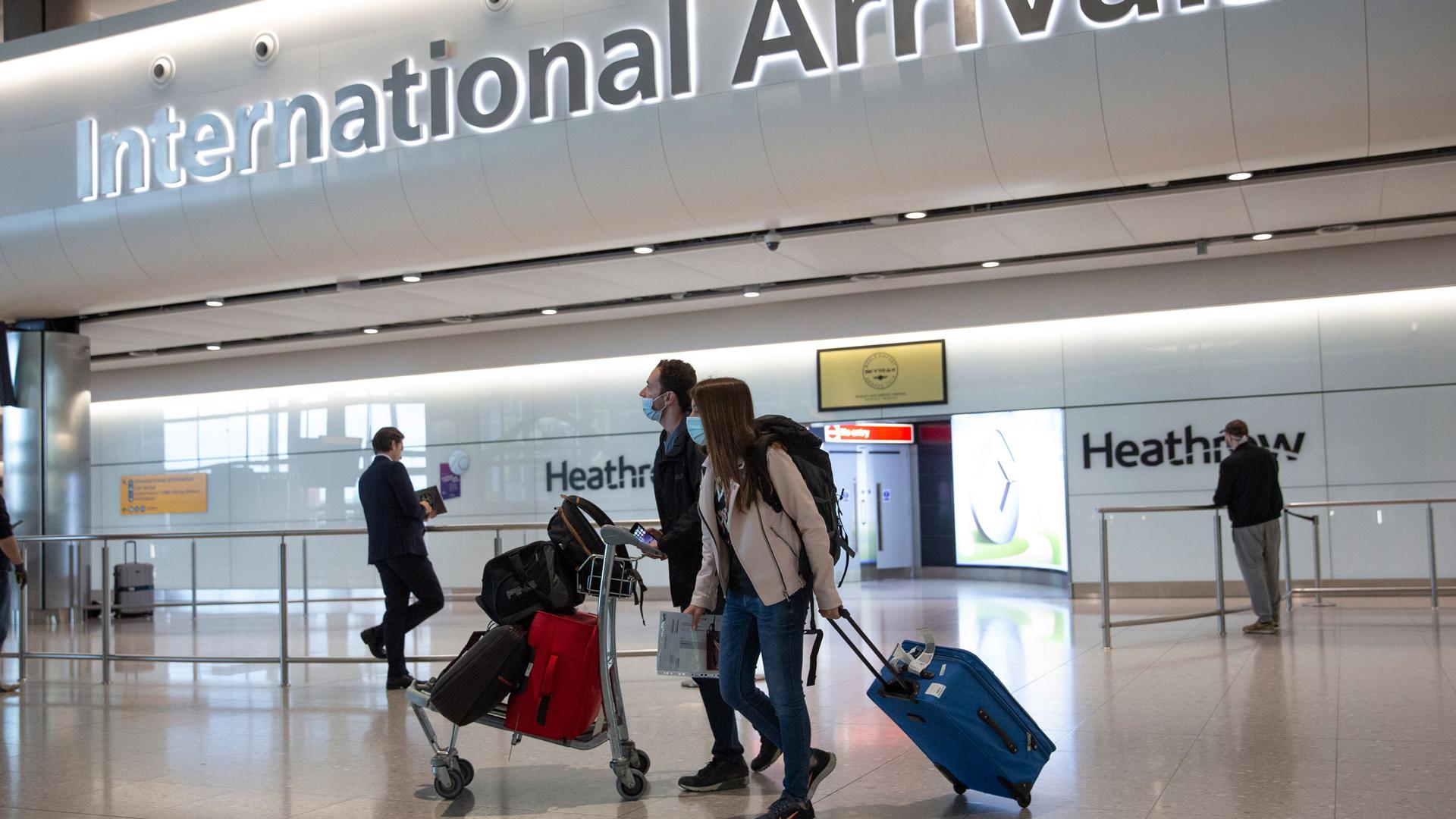For holiday travel, England uses COVID tests to reduce quarantines
Passengers wearing face masks arrive at London’s Heathrow Airport, June 2020. The two-week quarantine period that travelers arriving in England from a destination not on the British government’s coronavirus safe list could be cut to just five days if they test negative for COVID-19.
The British government has laid out a plan to reduce England’s 14-day quarantine requirement for travelers from destinations not deemed safe to as little as five days if they test negative for COVID-19 in a move that could boost holiday travel.
The change to the quarantine rules, which was announced Tuesday and takes effect on Dec. 15, has been long-awaited by the travel industry, one of the worst-hit sectors during the pandemic. The industry hopes it will spur British families to go on holiday over the Christmas break, especially if children won’t have to miss school upon their return.
Under the new rules, passengers from places not deemed safe can reduce the 14-day quarantine period by paying for a test from a private firm on or after Day 5 of their arrival at a potential cost of around $133. Results normally take a day or two.
“Our new testing strategy will allow us to travel more freely, see loved ones and drive international business,” Transport Secretary Grant Shapps said. “By giving people the choice to test on Day 5, we are also supporting the travel industry as it continues to rebuild out of the pandemic.”
Related discussion: Mental health and ‘pandemic fatigue’ ahead of the holidays
The change does not apply to the other parts of the United Kingdom. Travelers from Northern Ireland, Scotland and Wales must continue to self-isolate for 14 days.
Representatives from the four nations are meeting later Tuesday to come up with a UK-wide approach over the relaxation of restrictions over the Christmas period. All have indicated they will allow a degree of mixing between family and friends around Christmas, while stressing the need for caution.
The change in England’s travel rules brings them more in line with other European countries, including Germany. Still, with a maze of travel and quarantine restrictions around the world, few industry experts anticipate a rapid rush for the skies before vaccinations become widely available.
“We still have a complex jigsaw puzzle of restrictions around the world that need tourists to have a high IQ to understand,” said Paul Charles, chief executive of travel consultancy The PC Agency. “We need to see global consistency for travel to fully take off.”
Many popular holiday destinations, such as the United States or Canada, remain blocked off for English travelers, and trips to most of Europe require quarantining, except for isolated spots like Spain’s Canary Islands, off the coast of Africa.
Related discussion: Where do we stand with testing and a vaccine for the coronavirus?
British travelers have faced a chaotic, uncertain situation since travel was permitted again after the spring coronavirus lockdown. The Conservative government has taken countries off its safe list at very short notice, prompting many travelers to cut vacations short to Spain and France this summer and quickly return to the UK to avoid mandatory quarantines.
Tim Alderslade, chief executive of the industry association Airlines UK, said the announcement on a shorter quarantine period provided “light at the end of the tunnel” for the aviation industry and people wanting to go on holiday.
Mark Tanzer, chief executive of the travel trade group Abta, said the new testing scheme should make overseas travel “more attractive and manageable for both holidaymakers and business travelers.”
The government also announced new financial support for English airports and ground handling firms beginning in 2021.
“This new package of support for airports, alongside a new testing regime for international arrivals, will help the sector take off once again as we build back better from the pandemic,” said Treasury chief Rishi Sunak.
Sunak plans to unveil the government’s spending plans for 2021 on Wednesday.
By Pan Pylas/AP
